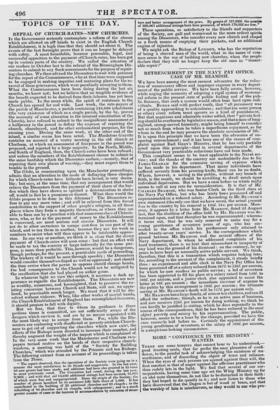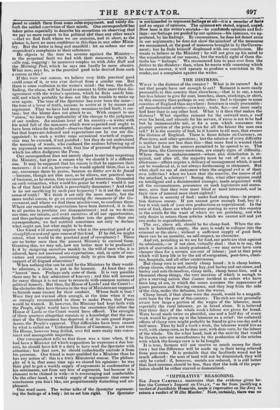MORE "CONFIDENCE IN THE MINISTRY" WANTED.
THERE are some tempers that cannot bear to be undeceived,— good trusting souls, that far prefer the easy pleasures of confi- dence, to the painful task of acknowledging the. existence of un- worthiness, and of discarding the object of trust and reliance. When the eyes of such persons are opened against their will, the first emotion is that of anger against the officious practitioner who thus rudely lets in the light. We find that several of our cor- respondents, having some time ago set the Whig Ministry up for an idol unto themselves, do not like to be disturbed in their faith : they had hoped to die quietly in it ; and now listen to those who have discovered that the Dagon is but of wood or brass, and that the worship of him is mischievous, as they would to one who pro-.
posed to snatch them from some calm enjoyment, and vainly dis- turb the settled conviction of their minds. One correspondent has taken pains especially to describe his sensations on observing that we pay no more respect to his political idol than any other man's —that we find fault where we see occasion, and in short, as the
phrase is, have no more confidence in this than in any other Minis- try. But the letter is long and manifold : let us reduce our cor- respondent's complaints to their substance. He objects to the tone we assume against the Ministry— to the perpetual fault we find with their measures, which he calls nag, nagging: he moreover couples us with John Bull and the Morning Post, which he says can hardly be more abusive. What now, says he, is the practical good to be derived from such a course as this?
If this were our course, we believe very little practical good could come of it, or was ever derived from a similar one. But there is some confusion in the writer's mind: the tone, the fault- finding, the abuse, will be found to amount to little more than dis- agreement with the writer's opinions, which he feels satisfy him- self, and which probably he does not like the trouble to make up
over again. The tone of the Spectator has ever been the same— the tone of a lover of truth, anxious to arrive at it by reason and
argument. That we have had many occasions to find fault, is cer- tain; but the blame does not attach to us. With respect to our "abuse," we leave the applicability of the charge to the judgment of our readers. An anxious lover of his country—a writer with his mind full of the measures which were expected and ought to have been taken for its relief—observes that none such are adopted, but that hopes are defeated and expectations one by one are dis- appointed: to such a writer some occasional warmth of expres- sion may be excused, if not justified : but they do not understand the meaning of words, who confound the zealous following up of an argument on measures, with that hue of personal depreciation which too often disfigures the Press.
Our correspondent does not merely object to our tone respecting the Ministry, but gives a reason why we should h Id a different .one. It may be supposed that his reason is that he approves their measures : it is not so, however—he would uphold them, that is to say, encourage them by praise, because no better are to be found —because, though not able men, as he allows, nor practical men of business, as he states, they are men of good intentions. Grounded on such estimation, what would his praise be worth ? would it not be of that faint kind which is proverbially damnatory ? And what is he not sacrificing by such poor hypocrisy ? is it not the sacred cause of truth? We think it not only the more manly, but the more useful course, to go on examining the measures of the Go- vernment, and where we find them mischievous, to condemn them. Where our reasonable expectations have been deceived, it is due to all parties to proclaim our disappointment ; and as we devote our time, our talents, acd avail ourselves of all our opportunities, and thus perhaps see something further into the game than our correspondents, we feel entitled sometimes not only to declare what ought not, but what ought to be done. Our friend will scarcely inquire what is the practical good of a straiglifforward and open course of this kind. If he did, we might retort, what would be the practical good of sycophancy ? There are no better men than the present Ministry to succeed them. Granting this, we may ask, how are better men to be produced? Is it by resigning ourselves meekly to the will of men who, it is . allowed, have not answered our expectations, and, in spite of con- viction and conscience, continuing daily to give them the poor support of ill-feigned admiration? When nothing else can be said for the Ministers by their would- be admirers, a claim is put in for honesty. At least they are "honest " men. Perhaps only some of them. It is very possible -.there may be a fair admixture of knavery; and this will account for many things it is not easy to reconcile with common notions of political honesty. But then, the House of Lords! and the Court !— the obstacles they have thrown in the way of Ministers are supposed to furnish some excuse for their conduct. Whose fault is that ? Were they not warned often enough, at the time when it was so strongly recommended to them to make Peers, that Peers would be wanted. If, however, the Minister had kept faith with the People, slight would have been the resistance that either the House of Lords or the Court would have offered. The strength
• of these quarters altogether consists in a knowledge that the con- duct of the Government has deprived it of its sole grand depen- dence, the People's approval. That difficulties have been caused by what is called an " Unformed House of Commons," is not true. No House, lowever long drilled, ever fell more easily into conve- nient and manageable majorities.
Our correspondent tells us that there was a time when, if he had been a Minister (of which supposition he expresses a due hor- ror), he should have felt it a duty to have read the Spectator with attention; but that now, he should undoubtedly exclude it from his presence. Our fiieud is more qualified for a Minister than he has any notion of: this is a truly Ministerial course. The philoso- phy of it is, that some time ago we shared his opinions : he was then glad to get .a weekly supply of arguments in confirmation of his sentiments, not from v love of argument, but because it is pleasant to be chimed in with—it is encouraging and comfortable. On the other hand, a weekly supply of arguments that come to conclusions you don't like, are proportionately disturbing and un- pleasant.
One ward more. The writer talks of the Spectator represent- ing the feelings of a body: let us set him right. The Spectator is not intended to represent feelings at all—it is a recorder of facts and an organ of opinions. The opinions fere stated, argued, urged. Now here is the writer's mistake—he confotinds opinions and feel- ings: our feelings are guided by our opinions—his opinions, we ap- prehend, by his feelings. By consequence, he does not detect error in our arguments; he does not show the mischief of' the measures we recommend, or the good of measures brought in by the Govern- ment; but he finds himself displeased with our conclusions. He wants to believe in the Ministry : he will not give up his mind to the consideration of our reasons, but the weekly sight of them dis- turbs his "feelings." We recommend him to pass over from the feelers to the thinkers .• then, when he meets with reasoning which he cannot answer, it will operate to produce a conviction in the reader, not a complaint against the writer.

















 Previous page
Previous page